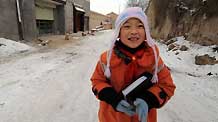November 20 Day Highlights Importance of Children
Adjust font size:
November 20 is the day for the world to focus on how it is treating its children, according to the head of the UN's child welfare body.
November 20 marks the 20th anniversary of the United Nations Convention on the Rights of the Child (CRC) and highlights the importance of children.
"It's an opportunity to talk about those critical issues that the convention stands for -- the rights of children and the progress that the world is making in terms of what's happening with children around the world," said Ann M. Veneman, executive director of the United Nations Children's Fund (UNICEF) in a recent interview with Xinhua.
Veneman said Nov. 20 was the opportunity to not just talk about children for one day but to stress the importance of investing in children every day.
It has been considered a day of worldwide fraternity and understanding between children all over the world, and to promote the protection, welfare and education of children, Veneman said.
Impact of financial crisis
Veneman is concerned about the potential impact the global financial crisis could have on the nutritional status of children." Because a child who is undernourished under the age of two can have permanent cognitive damage, which means that throughout their lifetime, their ability to learn and earn will be impacted and this perpetuates the cycle of poverty," she said.
"Clearly, we're concerned about children who may be taken out of school to either beg on the streets or work in child labor because their family is financially in difficulty. But again, it depends on where the children are, how they are affected."
Veneman stressed investment in health, education and child protection should not be reduced. "The investment in those kinds of services should remain solid and should not be decreased, particularly in a time when there is a financial economic slowdown."
Impact of climate change
The UNICEF chief also said the impact of climate change on children was a crucial issue.
"Climate change is increasing the severity and frequency of weather-related disasters. So we've seen more and more cyclones, extreme floods and this kind of thing," she said.
"Often those who are most impacted are living in the flood plain zones so their houses and schools are destroyed."
Veneman became UNICEF's fifth executive director on May 1, 2005. Appointed by the UN secretary-general, the executive director works on behalf of the United Nations children's agency to help children around the world survive and thrive by protecting their rights.
Since taking office, Veneman has traveled to more than 60 countries to review the plight of children and UNICEF's work to assist them. She has the first-hand knowledge of how children's lives are being saved and improved as a result of the assistance provided by UNICEF and its partners.
Veneman has witnessed the devastation caused by natural disasters, conflict, disease and exploitation.
"I just returned from the Philippines and saw the effects on poorer communities that are really in the flood plain," she said. "It's very important to see the impact of the weather-related disasters, the increase in frequency."
In addition, drought caused by the climate change, as Veneman pointed out, was also threatening the food security and nutrition security in families and children.
70 percent of small holdings farmers in the developing world were women and so women were often influenced when droughts came, she explained.
"We must look at the interconnection of climate change, of children, of livelihoods, of communities and all of these things need to be looked at together in terms of the impact on vulnerable populations," she said.
Founded in 1946, UNICEF is the only UN body dedicated exclusively to children and women. It is mandated to advocate for the rights of children.
Children in armed conflict
Children were also victims of armed conflicts in some countries, Veneman said.
"I just returned recently from my second trip to the Democratic Republic of Congo and, particularly in the east, the sexual violence is beyond what most people could ever imagine in terms of the horrible nature of it."
"Women raped multiple times, even men raped, I mean, the worst kinds of acts you could imagine," she said. "Many of these victims are truly under the age of 18 -- they're children."
"Children are often caught up in the war, they might be abducted and become child soldiers or abducted and become the sexual slaves of soldiers."
The director said it was crucial that the Security Council focus on crimes against children and that organizations like UNICEF be involved in reporting these kinds of violations to the Security Council each year.
On September 30, the UN Security Council unanimously adopted a resolution to demand that all parties to armed conflict take immediate action to protect civilians, including women and children, from all forms of sexual violence, and urged all countries to take greater measures to combat this scourge.
Progress made
Since adoption of the CRC in 1989, great progress has been made in various aspects related to children in the world.
Veneman said in some countries great progress has been made in reducing child mortality and making sure children had access to health facilities.
Progress had also been made in giving children rights to education and protecting children from trafficking, sexual exploitation and child labor, Veneman added.
But much more remained to be done in all these areas, she said. "Everyone needs to make a greater effort to ensure that the Convention on the Rights of the Child is really extended to all children everywhere, including those who are in the most difficultsituations and the most vulnerable."
(Xinhua News Agency November 20, 2009)





